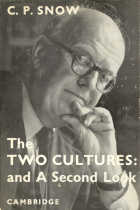
The industrial revolution according to Chrles Percy Snow laid the foundations of our world.
![]() Answer this question using Snow, Pursell, Postman, and Pacey.
Answer this question using Snow, Pursell, Postman, and Pacey.
Pacey argues a profoundly important point about an emergent technical gulf.
Postman asserts that ideas about organization emerged from Richard Arkwright's and Eli Whitney's inventions' impacts on machinery, and automation.
Snow argues, that to properly understand the ability of tools there is a need to see how human social organization changes the kind of education we experience–indeed education must change–to make the most effective use of new technology.
The challenges faced by modern technical culture depended on the development of the hydrogen bomb's technical facets, the industrial and scientific revolutions, and the gaps between the rich and the poor which involved changes in education, social organization and morality.
![]() Technology associated with war completely reshaped society.
Technology associated with war completely reshaped society.
![]() The failures, successes, and new inventions when adapted to aircraft, computers, and medecine brought automated power to a widespread audience.
The failures, successes, and new inventions when adapted to aircraft, computers, and medecine brought automated power to a widespread audience.
The creative imagination was so needed to bridge the gap that Snow sees growing due to specialization.
The existing technical complexity was matched by a new social order.
![]() Frederick Winslow Taylor & Henry Ford's stories support or challenge C. P. Snow's argument.
Frederick Winslow Taylor & Henry Ford's stories support or challenge C. P. Snow's argument.
Technological drivers
Information Age
Interpreting the essay
writing about Two Cultures
Snow's words | Snow's essay interpreted | The Two Culture's synopsis | The Redux Essay
Pursell | Pacey | Pacey's challenge | Postman | Eberhart | Snow | Kaku

